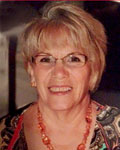September 6, 2017
PUBLISHER’S CORNER
 By Eloise Graham
By Eloise Graham
Heavens to Murgatroyd
About a month ago I was visiting with some friends when one of them queried, ”Have you ever heard the expression ‘Heavens to mergatin, or morgatoid’ or something like that?” I blurted out, “murgatroyd” and from what deep recesses of my mind that came from, I don’t know. I hadn’t heard that expression for years. I also had no idea what it meant. So I decided to do some research.
“Heavens to Murgatroyd” is an exclamation of surprise or shock. It seems to be American in origin dating back 50 to 60 years ago. The expression gained popularity from the cartoon character Snagglepuss of the Yogi Bear Show. There doesn’t seem to be any record of it predating the cartoon series. It is very likely the term was coined by the show’s writers. We have no idea who “Murgatroyd” was.
There are various spellings of the name; Murgatroid, Mergatroyd and Mergatroid. That suggests that it really doesn’t refer to a person as much as a whacky fanciful expression.
However, the name of Murgatroyd is used in Gilbert and Sullivan’s comic opera Ruddigore of 1887. At least ten
characters are named Murgatroyd and eight of those are ghosts. But where did Gilbert get this name? It appears that Murgatroyd has a long history as a family name in English aristocracy. In 1371, a constable was appointed for a district in Yorkshire. He adopted the name of Johanus de Morgateroyde – literally meaning John of Moor Gate Royde (the area leading to the moor)
Heavens to Betsy! There is speculation among word-origin scholars that “Heavens to Murgatroyde” was an out growth of “Heavens to Betsy.” This phrase, too, is an exclamation of surprise or shock. It is an American phrase traced back to the latter part of the 19tth century. The first known example was found in a 1857 U.S. journal. Who is Betsy – a real person? If so, Betsy who? Perhaps Betsy Ross, the famed American flag seamstress. That is one theory. Another is that it refers to the side arm or rifle of the early
settlers. Betsy was the slang term for the favorite firearm. We will probably never know for sure or even know the literal meaning of this exclamation.
In the early 1900s, there were many idioms and phrases that were quite popular. How about “Bee’s Knees”? Do bees really have knees? There is no reason for this term other than it came out of an era of random two-word phrases. Contemporary terms include “snake’s hips”, “kipper’s knickers” and “monkey’s eyebrows”. We do still hear the occasional “Scarce as hen’s teeth”.
Were you ever accused of throwing a hissy fit? This could allude to the hissing and sputtering when having such a fit. Or it could be a shortened form of the word hysterical.
Have you ever said something was the cat’s meow or the cat’s pajamas. These are terms used in the 1920s. The term “cat” was used to describe the unconventional flappers from that jazz era. Pajamas, or pyjamas as they were then called, were a new trend to women’s fashion, so the phrase referred to something highly sought and desirable.
Heavens to Murgatroyd, this was a fun subject to research!


